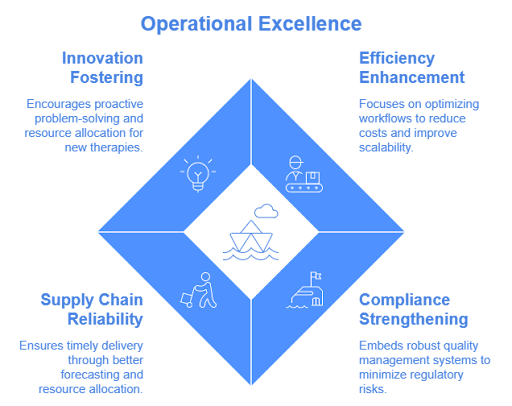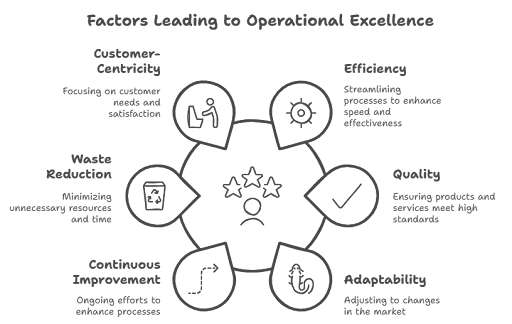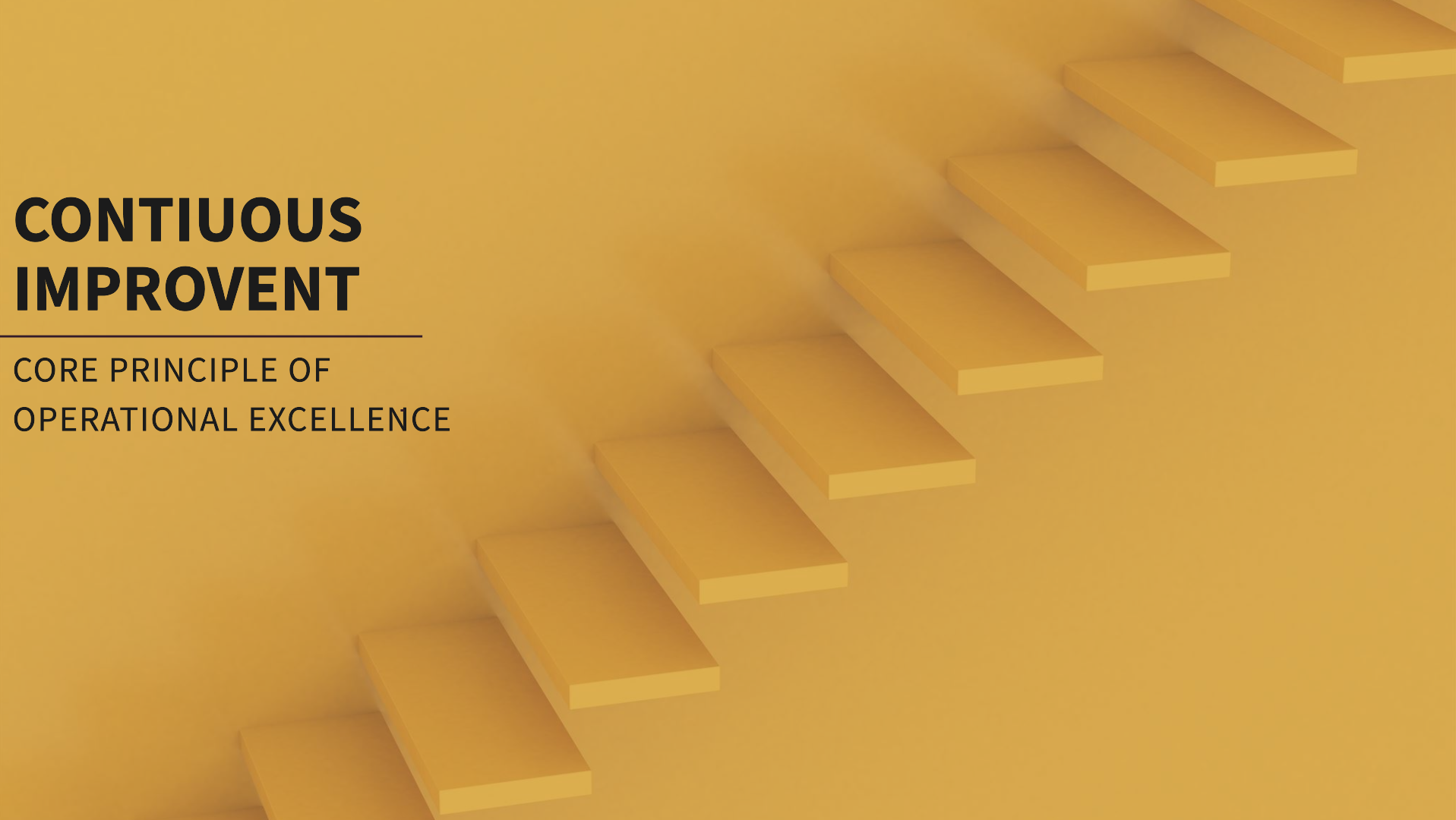Operational Excellence: What It Means and How to Achieve It
Understanding Operational Excellence
Operational excellence, a term frequently mentioned in business circles, is essential for long-term success. But what does it indeed mean, and how can companies implement it effectively?
Operations are any activities that take place within a business to achieve the business goals and secure sustainable growth. Excellence means how well a business can create a better user experience and maximize productivity and profitability. To put it simply, operational excellence means creating a business that outperforms the competition by doing things better than them and ultimately delivering as much value to the customers as possible.
The Importance of Operational Excellence in the Pharmaceutical Industry
Operational excellence has a profound and far-reaching impact on the pharmaceutical industry, enhancing efficiency and ensuring high-quality outcomes. By optimizing manufacturing workflows, companies can reduce production costs and improve scalability, which is especially critical given the industry’s high R&D expenses and complex regulatory requirements. Advanced methodologies enable identifying and eliminating inefficiencies, resulting in faster product development cycles and quicker time-to-market for critical medicines.
Here’s how it creates value:
1. Enhancing Efficiency and Reducing Costs
- Optimized Workflows: Streamlined manufacturing processes cut production costs and improve scalability.
- Addressing Challenges: This is especially vital in a sector known for high R&D expenses and stringent regulatory demands.
2. Accelerating Product Development
- Eliminating Inefficiencies: Advanced methodologies pinpoint bottlenecks, leading to faster product development.
- Faster Time-to-Market: Critical medicines reach patients sooner, benefiting both health outcomes and business performance.
3. Strengthening Regulatory Compliance
- Robust Quality Systems: Embedding comprehensive quality management systems ensures adherence to regulations.
- Data Integrity: Improved practices reduce the risk of compliance breaches, safeguarding company’s reputation.
4. Improving Supply Chain Reliability
- Accurate Forecasting: Enhanced resource allocation ensures timely product delivery.
- Optimized Supply Chain: Reliable supply chains boost patient satisfaction and business efficiency.
5. Fostering Innovation
- Resource Reallocation: Operational efficiencies free up resources for innovation.
- Proactive Problem-Solving: Encouraging creativity leads to novel therapies and expanded access to essential treatments.
Operational excellence strengthens compliance by embedding robust quality management systems and data integrity practices, minimizing the risk of regulatory issues. It also improves supply chain reliability by enabling better forecasting and resource allocation, ensuring the timely delivery of products to patients. Beyond operational gains, it fosters innovation by freeing resources and encouraging proactive problem-solving, allowing organizations to focus on developing novel therapies and expanding access to essential treatments. In essence, operational excellence helps pharmaceutical companies meet the dual demands of delivering value to patients while remaining competitive in a dynamic and challenging industry.

Core Principles of Operational Excellence
Operational excellence is underpinned by several core principles:
1- Customer-Centric Focus
Operational excellence starts with understanding customer requirements and aligning organizational goals to exceed those expectations. It’s about consistently delivering quality, reliability, and innovation that build trust and satisfaction.
2- Continuous Improvement
Continuous improvement emphasizes making small, incremental changes that result in significant advancements. Tools like Lean, Six Sigma, and Kaizen help organizations refine their operations and adapt to evolving challenges.
3- Leadership Commitment
Leaders are responsible for fostering a culture of accountability, innovation, and collaboration. Committed leaders ensure that operational excellence becomes an organizational priority, not just an initiative.
4- Employee Empowerment
Empowering employees fosters engagement, creativity, and proactive problem-solving. Businesses can unlock their workforce\’s full potential by providing training, clear objectives, and a supportive environment.
5- Data-Driven Decisions
Leveraging data analytics and digital tools to inform decision-making and track performance. Data-driven decisions eliminate guesswork and ensure actions are based on measurable insights. Analytics tools and key performance indicators (KPIs) are essential for tracking progress and identifying areas for improvement.
6- Process visibility
Ensuring that all stakeholders have a clear, real-time understanding of processes and workflows. Transparency in operations helps identify bottlenecks, monitor performance, and align teams. Tools like dashboards, IoT sensors, and process mapping provide the necessary insights to maintain efficiency and control
7- Continuous learning and training
A culture of continuous learning equips employees with the skills needed to embrace new technologies and processes. Ongoing training fosters adaptability and innovation, keeping organizations competitive in dynamic industries. How to Develop a Continuous Improvement Plan (cIP)
8- Agility and flexibility
Agility is the ability to adapt quickly to market conditions, customer demands, or operational challenges. Agile organizations can pivot effectively, minimizing disruptions and seizing new opportunities. Flexibility in processes, decision-making, and resource allocation is key to staying resilient in a dynamic environment.
9- Standardization
Standardization reduces variability, ensures compliance, and enhances efficiency. Creating a stable foundation enables smoother, consistent operations and easier scaling of successful practices.
10- Lean mindset
A Lean mindset drives efficiency by targeting non-value-added activities (waste). It aligns with customer-centric goals, emphasizing streamlined workflows and sustainable practices that enhance quality and reduce costs.
Summary
Operational excellence delivers transformative benefits across industries by fostering efficiency, quality, and adaptability. By emphasizing continuous improvement and waste reduction, organizations can streamline processes, lower costs, and enhance productivity. A strong focus on customer-centricity ensures that products and services consistently meet or exceed expectations, building trust and loyalty. Moreover, operational excellence encourages data-driven decision-making and fosters a culture of accountability and innovation, empowering employees to take ownership and drive success. These improvements not only enhance profitability but also equip organizations to remain resilient and competitive in an ever-changing market.

Now that we’ve explored the transformative power of operational excellence, it’s time to dig deeper! In the coming articles, we’ll unpack each core principle—from customer-centricity to Lean mindset—and reveal how they drive real results in the pharmaceutical industry. We’ll also explore the tools that make it all possible. How does Six Sigma reduce variability? Why is process visibility a game-changer? And what role does digital transformation play in achieving agility and precision? Get ready to discover actionable insights and practical strategies that can elevate your operations to the next level. Stay tuned—it’s going to be a journey worth taking!

